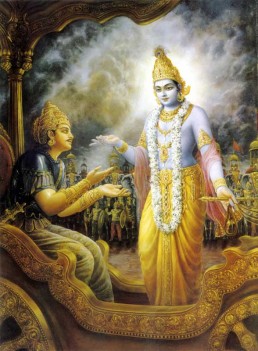Commentary
Every member of the Universe follows the principle of Yajna and contributes to the smooth running of the Universal Wheel of Action. But among all the living creatures only man has been endowed with the option of freedom of action – to contribute to the harmonious working of the cosmic mechanism or strike a discordant note.
While a majority of the people live abiding in the Law of Harmony, there are some who do not believe in this Eternal Law and revolt against it. During such dark periods nobody works with the spirit of Yajna without which no favorable circumstances can be created (rain) for the productive potential to manifest. Such seekers of selfish pleasures bring about discordance in the Wheel of Action. They are considered to be living in sin and that too in vain by the Gita.
In these verses (10 to 16) the Vedic conception of sacrifice as an inter-link between God and man is set in the larger context of the interdependence of beings in the cosmos. He who works for himself alone lives in vain.
TO THE ONE WHO REMAINS SATISFIED IN THE SELF, THERE IS NOTHING TO WORK FOR
Swami Chinmayananda
Swami Chinmayananda Commentary
The commentary on this verse and the rest, is avaialble for free as:
Kindle eBook
Google Play Book
Apple Books
Adi Sankara Commentary
O Partha, sah, he; jivati, lives; mogham, in vain; yah, who, though competent for action; na anuvartayati, does not follow; iha, here, in the world; cakram, the wheel of the world; evam, thus; pravartitam, set in motion, by God, on the basis of the Vedas and the sacrifices; aghayuh, whose life (ayuh) is sinful (agham), i. e. whose life is vile; and indriya-aramah, who indulges in the senses-who has his arama, sport, enjoyment, with objects, indriyaih, through the senses.
Therefore, the gist of the topic under discussion is that action must be undertaken by one who is qualified (for action) but is unenlightened. In the verses beginning from, ‘(A person does not attain freedom from action by adstaining from action’ (4) and ending with, ‘You perform the obligatory duties…. And, through inaction, even the maintenance of your body will not be possible’ (8), it has been proved that before one attains fitness for steadfastness in the knowledge of the Self, it is the bounden duty of a person who is qualified for action, but is not enlightened, to undertake Karma-yoga for that purpose. And then, also in the verses commencing from ‘(This man becomes bound) by actions other than that action meant for God’ (9) and ending with ‘O Partha, he lives in vain,’ many reasons [Such as, that it pleases God, secures the affection of the gods, and so on.] have been incidentally stated as to why a competent person has to undertake actions; and the evils arising from their non-performance have also been emphatically declared.
Such being the conclusion, the question arises whether the wheel thus set in motion should be followed by all, or only by one who is ignorant of the Self and has not attained to the steadfastness which is fit to be practised by the Sankhyas, the knowers of the Self, through the Yoga of Knowledge only, and which is acquired by one ignorant of the Self through the means of the practice of Karma-yoga mentioned above? Either anticipating Arjuna’s question to this effect, or in order to make the meaning of the scripture (Gita) clearly understood, the Lord, revealing out of His own accord that the following substance of the Upanisads-Becoming freed from false knowledge by knowing this very Self, the Brahmanas renounce what is a compulsory duty for those having false knoweldge, viz, desire for sons, etc., and then lead a mendicant life just for the purpose of maintaining the body; they have no duty to perform other than steadfastness in the knowledge of the Self (cf. Br. 3.5.1)-has been presented here in the Gita, says:
The Bhagavad Gita with the commentary of Sri Sankaracharya – Translated by Alladi Mahadeva Sastry
Holy Geeta – Commentary by Swami Chinmayananda
The Bhagavad Gita by Eknath Easwaran – Best selling translation of the Bhagavad Gita
The Bhagavad Gita – Translation and Commentary by Swami Sivananda
Bhagavad Gita – Translation and Commentary by Bhaktivedanta Swami Prabupadha
Srimad Bhagavad Gita Chapter 3 – Verse 16 – 3.16 evam pravartitam – All Bhagavad Gita (Geeta) Verses in Sanskrit, English, Transliteration, Word Meaning, Translation, Audio, Shankara Bhashya, Adi Sankaracharya Commentary and Links to Videos by Swami Chinmayananda and others – 16-Mar

